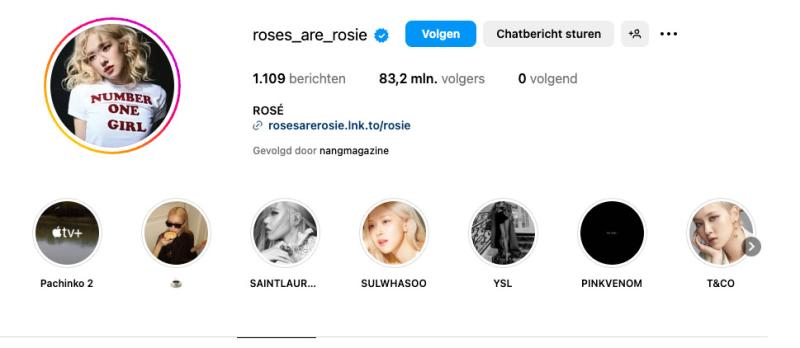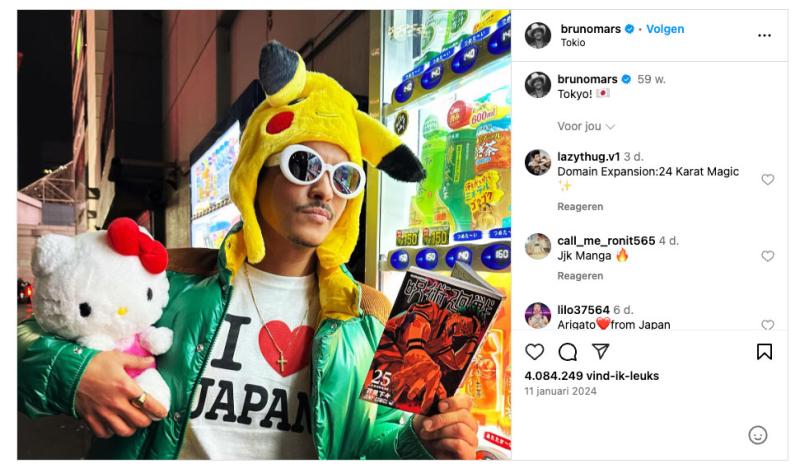You had to live under a rock to not hear this song. On Oct 18, 2024, “Apt.” a collaboration between K-pop singer Rosé & and American singer Bruno Mars exploded onto the pop music scene. This bouncy song attracted 25 million views within 24 hours on YouTube and amassed over 500 million views in less than 48 days. As of writing (Feb 2025), it has surpassed over a billion views.
It broke a record on Billboard’s Global 200 excl. US chart, topping the chart for the 15th time, breaking the record set by Mariah Carey’s Christmas classic “All I Want for Christmas Is You” (1994). It hit No. 1 on the Billboard Japan Hot 100, becoming the first song by a Western act to top the Japan chart in more than 11 years.
Although Rosé and Bruno Mars were referred to as a K-pop act (for example, as the fastest song by a K-pop act to reach a billion streams in Spotify's history), it would be more accurate to call it a Pop Pacific hit blending elements of American and Korean culture. There is little reference to Korea except for the title, which refers to a popular Korean drinking game called the “apartment game,” the first line of the song, and two small Korean flags that Bruno Mars waves. The track itself featured a catchy chorus that repeatedly chants the word “apateu,” an English loan word that in Korean means “apartment” but other than that, the lyrics are in English (like many K-pop songs). The song itself invokes 1980s motifs in its fashion and visuals. Rosé and Bruno Mars, both clad in black leather jackets and a white t-shirt, play instruments and prance to a pink background.
The artists themselves possess transnational backgrounds. Bruno Mars, the international superstar, was born Peter Gene Hernandez in Hawaiʻi to a Puerto Rican/Jewish father from New York, and a Filipina mother from Manila. Rosé, a K-pop star, is the stage name of New Zealander Roseanne Chaeyoung Park, born to Korean parents. The song resulted from their transnational collaboration. Both artists were signed to Atlantic Records, a subsidiary of multinational corporation Warner Music Group. As Rosé recounted, Bruno Mars asked her to pitch him three songs for a collaboration and she sent him “Apt.” He rearranged the song, added a verse, and a global hit was born.
This hit embodies K-culture, a transnational Korean culture featuring heavy American and some Japanese influences as a legacy of Korea’s tumultuous 20th century. Although transnational in nature, we give it a national label “K” for Korea. Let’s take a deeper look into the Pop Pacific nature of this song.
Rosé - Korean from down under
“Apt.” starts with the Korean line that can be translated as “Chaeyoung's favorite random game”(Chaeyoungi ga joahaneun rendeom geim 채영이가 좋아하는 랜덤 게임, 랜덤 게임), a reference to the “Apartment game”. Chaeyoung is Rosé’s Korean name.
Rosé has showcased her Korean cultural background with a Korean cooking demonstration explained in English, her first language.
A New Zealander raised in Australia singing about a Korean drinking game? It is not as strange as it sounds when you realize that Australia and New Zealand have become part of an Asian-Anglo-Pacific cultural sphere. Rosé represents the mass migration of Asian immigrants stimulated by long-term business immigration schemes over the past few decades. 17.3% of New Zealand's population identified as Asian in the 2023 census, with Asians making up 31.3% of Auckland, the largest city in New Zealand (and Rosé’s birthplace). In Australia, 17.4% of the Australian population identified with Asian ancestry in the 2021 census.
As for the Korean diaspora, by 2018, there were 35,000 people in New Zealand identifying with Korean ancestry, making up 0.76% of the population. In Australia, about 100,000 people identified themselves with Korean ancestry about 0.4% of the nation’s population. These Koreans became part of a larger panethnicity known as “Asian” grouped together with other groups like Chinese or Vietnamese. These overseas-born Korean performers would help the transnational appeal of K-pop.
At the age of seven, Rosé moved to Melbourne, Australia. A shy girl, she spent hours on the piano singing the songs she heard on television. At her father’s behest (or as Rosé noted, because he was probably sick of hearing her singing at the top of her lungs at midnight), she auditioned for Korean entertainment agency YG Entertainment, passed the audition, and in 2012 moved to Korea at the age of fifteen to become a trainee. Korea had become a center of global entertainment, crafting heavily Western-influenced K-pop. This genre reflected a highly multicultural Korean pop culture and media ecosystem that garnered worldwide popularity and served as the global face of a modern Korea.
Her transnational background can be seen in her initial adjustment to Korea. Although raised in a Korean family in Australia, she had trouble adjusting to life in Korea. When asked by The Cut about culture shock in Korea, she answered:
I thought I knew everything about Korean culture. It turns out there was a lot I didn’t know. And being young, I was scared for a minute, but I got over it. I did what one has to do to survive and learned the culture. I am very not Korean, but I’m also very Korean at the same time.
Rosé debuted as a member of the multinational group BLACKPINK, which sings in Korean but has two international members: Rosé and Lisa Manobal, a Thai. A third member, Jennie Kim, is a Korean who attended middle school in New Zealand, while Jisoo is the only member born and raised in Korea. One of the key facets of K-pop is its transnational nature and how it uses performers from different nationalities. Her not being very Korean but being very Korean at the same time served her as a K-pop star. She could be a Korean-Australian in Korea, but also an ambassador of Korean culture overseas, for example in her video teaching how to cook Kimchi fried rice.
Bruno Mars - Pacific Rim performer
Filipino and Puerto Rican communities historically migrated to Hawaiʻi as cheap labor to work on the sugar plantations. Today 368,000 people, or about 25% of Hawaii’s population, has Filipino ancestry, making them the second largest ethnic group in the state. About 48,000 people or 3.4% of the state’s population can claim Puerto Rican ancestry. Mars’ parents worked in tourism, Hawaii’s largest industry which contributes about 25% of the state’s economy. His father, inspired by his love of Elvis Presley (who loved the islands), came as an entertainer, while his mother emigrated from Manila and performed as a hula dancer at a Waikiki show. Mars entered the tourism economy at the age of 2 and a half, when he appeared in his father’s show as the world’s youngest Elvis impersonator.
Reflecting the lack of job opportunities and affordable housing, he, his father and brother were homeless after his parents divorced and for some time lived in a cabin without a bathroom in a private park. In 2003, like many local youth, he moved to Los Angeles after high school, because of limited job opportunities at home. In an interview with Latina magazine, he spoke of his struggle making it as a multicultural artist as record label executives asked him, “What are you? Are you urban? Are you Latin?” Mars further explained the difficulties of being mixed-race Asian-Latino:
There are a lot of people who have this mixed background that are in this gray zone.... A lot of people think, ‘This is awesome. You’re in this gray zone, so you can pass for whatever the hell you want.’ But it’s not like that at all. It’s actually the exact opposite. What we’re trying to do is educate people to know what that feels like so they’ll never make someone feel like that ever again.
Record executives ethnically pigeonholed him. He explained to GQ magazine in 2013 the response he would get from executives:
Your last name's Hernandez, maybe you should do this Latin music, this Spanish music.... Enrique's so hot right now.
As a consequence, he changed his name to “Bruno Mars” to increase his marketability. His childhood nickname “Bruno” came about because of his resemblance to pro wrestler, Bruno Sammartino. He asserts that he did not change his name to hide his Puerto Rican identity. As he recollects:
I never once said I changed my last name to hide the fact that I’m Puerto Rican….The real story is: I was going to go by ‘Bruno,’ one name. Mars just kind of came joking around because that sounds bigger than life.
Thus, just like how many Japanese and Korean performers (including Rosé) adopted westernized stage names, or spelled them in roman letters to add a Western aura, he avoided the stereotypes with his name.
After initial struggles, he turned his transnational upbringing into success. He won Grammy awards, including album of the year (2016), and became an international superstar with successful world tours. Besides collaborating with superstars like Lady Gaga, he has also collaborated with another mixed-race Asian, the Grammy award winning Anderson .Paak (Brandon Paak Anderson) of African American and Korean heritage, creating the highly acclaimed duo Silk Sonic.
Conclusion: “APT.” as a Pop Pacific Hit

.
“Apt.” has followed “Gangnam Style” (2012) as a worldwide Pop Pacific hit success. CC BY-SA 2.0Korea.net / Korean Culture and Information Service (Jeon Han)
There have been many other Pop Pacific hits which made it big across the world. “Sukiyaki” (“Ue wo muite arukou,” 1961), by Japanese singer Sakamoto Kyu, topped the charts in the US and worldwide, in 1963 becoming among the best-selling singles of all time with 13 million copies sold. “Gangnam Style” (2012) by Korean singer PSY, topped the charts worldwide, and became YouTube’s first billion-view video (over 5 billion views as of February 2025). “Apt.” follows in the footsteps of these songs and shows the growing power of Asia in the world music market. This Pop Pacific hit, which features an Australian and an American singing a song in mostly English with Korean words, represents the delightful transnational nature of the Pop Pacific.
Discussion Questions
- How popular did “Apt.” become on YouTube and the music charts?
- What does the title “Apt.” mean in the song, and where does it come from?
- Why is “Apt.” better called a Pop Pacific song than just K-pop?
- What in Rosé’s and Bruno Mars’s family history makes this song transpacific?
- Can you name another song that mixes cultures or languages?
- How can blending cultures in a song help make it a global hit?
- What do you think the global success of “Apt.” suggests about how people today feel connected across cultures?
- Do you think labeling such a song with a national tag (like “K-pop”) helps or limits our understanding of its global and blended nature? Why?



Add new comment